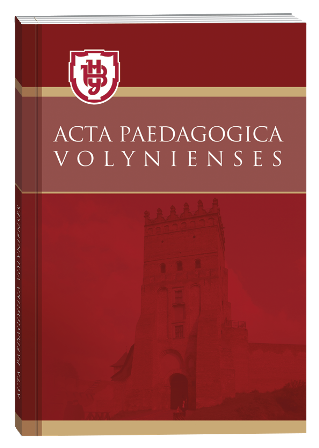PROFESSIONAL SKILL AND PROFESSIONAL COMPETENCE OF THE TEACHER-ORGANIZER
DOI:
https://doi.org/10.32782/apv/2023.2.4Keywords:
teacher-organizer, professional skill, professional competenceAbstract
The article examines the main tasks of a teacher-organizer in an institution of general secondary education, the stages of professional pedagogical competence formation. In the modern conditions of the national education system development, one of the priority tasks is the training of a competent, competitive specialist who is able to successfully solve problematic tasks, think flexibly and outside the norm, and be able to adapt to rapid changes in life in a multicultural environment. A special place in the system of educational work in the general secondary education institution is occupied by the position of teacher-organizer, focused on positive educational influence. The specified position is complex and multifunctional, and therefore requires a high level of professionalism from the teacher-organizer. Therefore, increasing the level of professional competence of the future teacher-organizer, who is able to think creatively, model the educational process, be a generator of ideas, and introduce modern innovative technologies into the educational process of an educational institution. This is due, firstly, to the fact that a professionally competent teacher has a positive effect on the formation of a creative personality, secondly, he can achieve better results in his work, and thirdly, he realizes his creative potential. The authors of the work determined the scientific and theoretical justification of the role of the teacher-organizer in the institution of general secondary education. The historical aspects of the position of teacher-organizer formation are considered. The key competencies that are necessary during the provision of quality educational services, related to the modernization of the content, optimization of methods and organization technologies of the educational process, have been determined. It was found that in the educational process a special place is acquired by the competence approach, which allows to form a professionally mobile teacher-organizer with a high level of general, cultural and professional development, a specialist capable of changes and systematic self-improvement.
References
Бойчев І. І. Практикум з організації культурно-дозвіллєвої діяльності учнів / за ред. О. С. Цокур. Одеса : [б. в.], 2003. 16 с.
Гусак В. М. Розвиток професійної компетентності педагога-організатора в умовах післядипломної освіти (результати дослідження). Науковий часопис Національного педагогічного університету імені М. П. Драгоманова. Серія 5. Педагогічні науки: реалії та перспективи: зб. наук. праць. Київ: Вид-во НПУ імені М.П. Драгоманова, 2018. № 61. С. 67–72.
Довідник педагога-організатора : навч.-метод. посіб. / упоряд. Л. Кацинська, Г. Ситник. Рівне : [б. в.], 2001. 140 с.
Кваліфікаційна характеристика педагога-організатора. Інформаційний збірник Міністерства освіти і науки України. 1992. № 22. С. 26–27.
Концепція національно-патріотичного виховання у системі освіти України. URL: file:///C:/Users/UserP/Downloads/62a0421e24258666156501-1.pdf (дата звернення: 10.05.2023).
Кутузова Г. І. Культурно-дозвіллєва діяльність: навч. посіб. Луцьк : Вежа-Друк, 2013. 252 с.
Мешко Г. М. Вступ до педагогічної професії : навч. посіб. Київ : Академвидав, 2010. 200 с.
Підготовка майбутніх учителів до впровадження педагогічної технології / за ред. І. А. Зязюна, О. М. Пєхоти. Київ : А.С.К., 2003. 240 с.
Синявський В. В Професіограми і психограми професій педагогічного спрямування : метод. посіб. Кіровоград : Імекс-ЛТД, 2014. 84 с.
Словник української мови в 11 тт. АН УРСР. Т. 8 / за ред. І. К. Білодіда. Київ : Наукова думка, 1977. 799 с.







